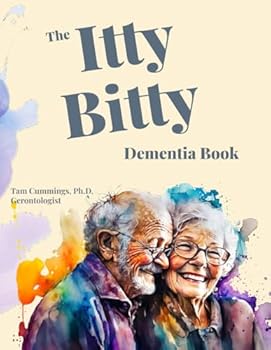The Itty Bitty Dementia Book
Of all the dementia books for caregivers, The Itty Bitty Dementia Book provides useful, actionable advice and information that truly helps caregivers and family members. After reading it, caregivers will fully understand dementia -- its causes and outcomes -- and be able to put this knowledge to work to provide better care, anticipate future care needs, and keep their vulnerable loved one safe and secure. The Itty Bitty Dementia Book provides five, fully illustrated chapters that quickly get the reader familiar with the Nine Common Forms of Dementia as well as how the disease progresses through seven stages. This indispensable dementia caregiver guide provides straightforward, understandable information about the nine common forms of dementia. It serves as a workbook for dementia caregivers, with helpful exercises and a collection of invaluable assessment tools that can provide beneficial guidance in determining the stage of dementia and anticipating future care needs. Short, easy-to-read chapters and illustrations cover: Chapter 1 -- There are five important questions all families need to ask about their loved one, from "Which dementia does he/she have," to "How well do you understand the disease progression?" Chapter 2 -- Learning how the brain controls the body is a critical part of understanding how the nine common forms of dementia affect the brain and how damage in different lobes affects the senses, moods, reasoning, muscle control and more. Chapter 3 -- Many families understand that dementia involves memory loss, but they don't understand how the ability to retrieve, recall, and store information affects behaviors. This chapter provides real life examples of how memory loss can cause a wide range of challenging behaviors and provides advice on how best to cope with them. Chapter 4 -- You'll gain an in-depth understanding of the nine common forms of dementia, how each progresses, and the anticipated behaviors and challenges that each form presents. Chapter 5 -- In this chapter you'll discover the characteristics most common to each of the seven stages of dementia. The information can help you identify the current stage of a loved one's dementia and assist you in planning for future care. Appendix -- Assessment Tools -- A variety of tools provide useful ways to determine the current stage of the disease as well as tools to determine pain, discomfort, depression, or anxiety that can cause behavioral problems. Other tools assess a person's abilitiy to perform basic activities of daily living. Also included is an assessment tool that determines the level of physical and emotional burden felt by caregivers.
Format:Paperback
Language:English
ISBN:B09TB4YG6X
ISBN13:9798417864568
Release Date:February 2022
Publisher:Independently published
Length:143 Pages
Weight:0.77 lbs.
Dimensions:11.0" x 0.3" x 8.5"
Customer Reviews
0 rating





